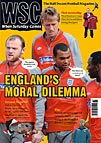 Harry Pearson delves into a book containing allegations of football bribery on an international level
Harry Pearson delves into a book containing allegations of football bribery on an international level
Declan Hill is an award-winning Canadian investigative journalist. The Fix – Soccer and Organized Crime was published in Toronto in 2008. So far no UK publisher has taken on this detailed account of match-fixing across the globe. There is good reason for this.
The British libel laws are the most draconian in the free world. Books that top the bestseller lists in continental Europe – an unflattering biography of US cyclist Lance Armstrong being the most recent example – never see the light of day over here, buried as soon as the publishers’ lawyers catch sight of them.
It took over three years before Willy Voet’s sensational Breaking the Chain, an insider’s account of drug taking in professional cycling, was published in this country and even then, despite the fact that by then most of the main protagonists had spilled their guts to the French courts, it still had to have 30 or so pages deleted for fear of writs.
I imagine The Fix would be similarly truncated by the British lawyer’s pen. The book contains such a plethora of sleazy characters and backstairs shenanigans that at times reading it is like taking a long soak in a slurry tank wearing shit for a hat. But our libel laws protect sleazy characters – that is how Robert Maxwell got away with it for so long.
At first, I should say that The Fix is a little underwhelming. There is a predictable stew of Far Eastern Mr Bigs with unlikely nicknames: “His given name was Cho Wong Chao but everybody called him Dennis”, that sort of thing. These criminal geniuses seem to spend an inordinate amount of time trying to rig games in the Sarawak equivalent of the Vaux Wearside League.
And then there are the convicted fixers who are intent on convincing everybody that what they did was the tip of the iceberg, that all football is corrupt and that even major matches like the Champions League final are routinely tampered with. When corrupt German referee Robert Hoyzer was first unmasked he declared that he would expose the entire rotten core of German football. Yet nothing came of it. Many criminals try to excuse themselves by claiming their behaviour is commonplace; bent match officials are no exception.
As The Fix rumbles on its sweaty way, however, the welter of detail builds and so does the sordid atmosphere as Hill holds clandestine meetings with mob bosses in Singaporean KFCs and in suites at Thai golf resorts, where beautiful, vacant-eyed girls lie on the beds watching Hollywood rom-coms on soundless TVs.
And then we arrive at the chapter of the book devoted to the World Cup in 2006 and in particular to the Ghana team. Before the tournament a genuinely scary Far Eastern gangster has assured Hill that the Black Stars have been bought, and later specifically that their game against Brazil in the second round knockout stage has been fixed via an intermediary, a former Ghanaian international turned national Under-17 coach revealed to be Abukari Damba.
Hill can find no hard evidence to support the claim but when he travels to Ghana and asks several of the Black Stars about corruption their frankness is disarming. The captain Stephen Appiah tells him that at the Athens Olympics he was approached by a gambler who initially offered him $200,000 (£125,000) if Ghana conceded the first goal in their second game, against Paraguay. When Appiah rejected the idea, the gambler took a different tack, asking if Ghana would go all out to try and win the game, allegedly paying them $20,000 when they did.
Clearly there is a good deal of difference between being paid money to try to win a football match and being given money to try to lose one. You don’t have to have watched many episodes of The Sopranos, however, to recognise this as a baiting of the trap.
Sure enough a few years later allegations that Ghana players took bribes to throw a match with Iran surface. When Hill asks the Ghana FA president, Kwesi Nyantakyi, about match-fixing the response is surprisingly blunt. Nyantakyi outlines a scenario in which gamblers and gangsters hang around the team seeking an “in” and occasionally find it through the disillusioned or financially desperate (the latter situation clearly exacerbated in teams where there is a massive disparity between those playing for major European clubs and those who aren’t). According to the official – whose testimony cannot be verified – some Ghana players were prepared to throw a match for as little as $500 each.
It may seem a little hard to swallow, that international footballers would chuck a game for the price of a new TV. But then you recall Hansie Cronje, captain of the South Africa cricket team and a national hero, who agreed to ensure a test match result to satisfy Indian bookmakers. Cronje, wealthy beyond the dreams of most of us, rigged an international match for a few thousand quid and a leather jacket. A deeply religious man, the South African blamed the devil who he said “whispered in his ear”. Doubtless the devil has subsequently found other ears to murmur into. Who is to say that some of them aren’t attached to the heads of footballers?
From WSC 277 March 2010